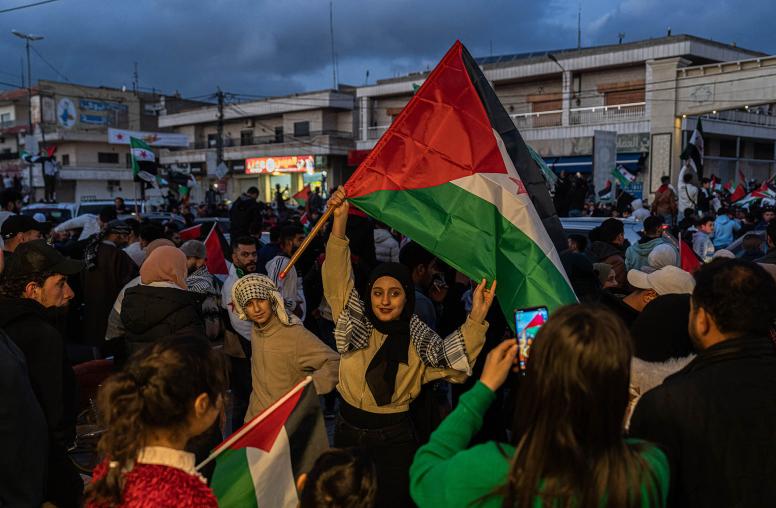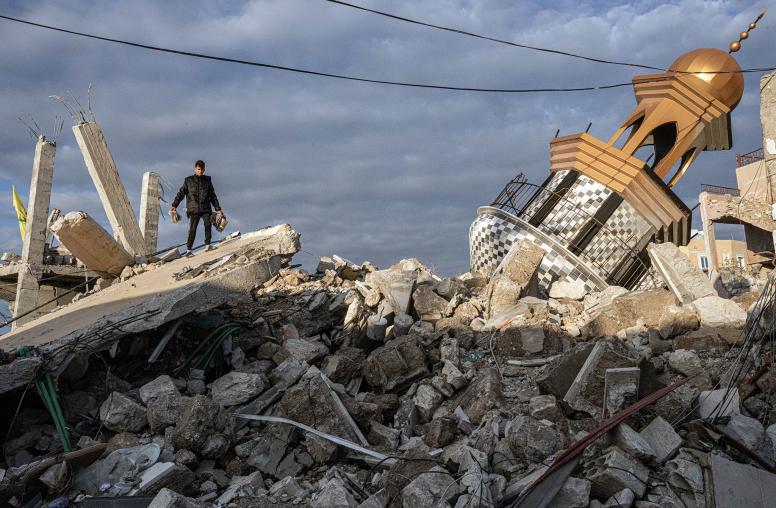Sen. John McCain: U.S. Must Sustain Momentum of Arab Spring
Senator John McCain sees the Arab Spring as the most consequential event since the fall of the Ottoman Empire and for the U.S., a “moment when we must clearly define what we stand for, and not just what we are against.”

Sen. McCain appeared at the United States Institute of Peace May 19 to deliver the annual Dean Acheson Lecture, where he praised President Barack Obama for the courage it took to carry out the raid against Osama bin Laden. The operation was done in a way that preserved intelligence and American lives, he said.
Speaking at USIP just a few hours after President Barack Obama’s speech on the Middle East, Senator McCain also addressed the recent turmoil in the Arab world, saying the developments represented a “collective demand for human dignity, economic opportunity and peaceful political change.”
“It should also put to rest the ugly claim, heard all too often over the past decade, that the Arab world is somehow condemned to despotism – that unlike people everywhere else, Arabs are not ready, not capable, or not fit for democracy,” the senator said in USIP’s Great Hall in its Washington headquarters.
Sen. McCain called for changing anti-American regimes, consolidating nascent democracies, reforming pro-American autocracies and renewing the Israel-Palestinian peace process -- echoing many of the same themes President Obama had touched on in his own speech.
The Arizona Republican said he is optimistic about the wave of revolution across the Middle East and North Africa, but he hopes the U.S. does everything it can to seize the moment, not squander it. It is a time when national unity is important – much in the same way that the lecture’s namesake was able to lead during the Cold War.
“We cannot be paralyzed by this tectonic change. Instead, we must work to shape it,” he said.
Countries with regimes that are incompatible with a free Middle East must be forced to change. The U.S. must support Iran’s Green Movement, for example, by placing effective sanctions on that country.
On Syria, Sen. McCain said there could be few options worse than Syrian President Bashar al-Assad, and the U.S. must step up to push his regime out.
“To believe that despite all of this that Bashar al-Assad is a reformer is an exercise in gross self-deception,” he said, noting that the Assad regime has the “blood of hundreds of U.S. troops and countless Iraqi civilians on its hands.”
“We must do all we can, short of military action, to help the Syrian revolution to succeed,” Sen. McCain said, adding that he would “urge the administration” to continue “ratcheting up the pressure” on Syria, in coordination with the European Union and Turkey. He again praised President Obama for steps the administration has taken against the Syrian regime, though he urged the White House to publicly call for the Syrian president to go.
In Libya, Sen. McCain would like the U.S. to move away from an “incremental escalation of pressure on Libyan leader Col. Muammar al-Qaddafi in favor of a more decisive course of action.” He said he would like to have U.S. strike aircraft “back into the fight” to destroy the Libyan leader’s command-and-control sites and have the American government recognize the transitional national council in Benghazi as “the legitimate voice” of the Libyan people. Congress would soon transfer billions of dollars in Qaddafi’s frozen assets to the Libyan people, he said, dismissing the concern that Libyan opposition leaders such as the Muslim Brotherhood or others could be terrorists-in-waiting. “If these people are al-Qaida my friends, then I am a liberal Democrat,” Sen. McCain said.
In other countries, the U.S. has been criticized for its lukewarm opposition to regimes where people have called for change – like in Bahrain. “The United States is fully committed to our partnership with the Kingdom of Bahrain, as well as its Gulf neighbors, but we want them to stay on the right side of history in their countries – because that is where the United States must, and will, remain,” he said. It is critical now for the U.S. to sustain the momentum that has already begun in the birthplace of the Arab Spring, he said.
“As we work to support democratic revolutions in Iran, Syria and Libya, our next objective should be to consolidate democratic transitions in countries where they have already begun, especially in Tunisia and Egypt,” he said. Both countries are facing an “explosion” of political activity, including Tunisia, where there are now 65 registered political parties.
“Both countries are facing serious short-term economic difficulties as a result of their revolutions,” he said. Tourism has taken a large hit, he said, noting that he and Sen. Joseph Lieberman (I-Connecticut) had travelled to the region recently, staying in a large hotel in Tunis that was otherwise empty. Economic assistance to these countries is critical at a critical time in their histories. “It is the economies of these countries that will largely determine their political fortunes,” he said.
At the same time, the senator noted, this doesn’t mean the U.S. should begin shoveling American aid to these countries. The current leaders in Congress were elected to cut spending, he said, and the U.S. can’t develop a Marshall Plan of sorts for the region in the wake of the Arab Spring. But the goal should be to seek free trade agreements and find “creative ways” to martial the support of the American private sector and the generosity of countries like Qatar to help sustain their flagging economies, he said.
Sen. McCain also reiterated his position on a two-state outcome between the Israelis and Palestinians, insisting that the Palestinians recognize Israel so the two can live side-by-side in peace and security. He worried aloud how a “stalled or deteriorating situation” between the Palestinians and Israelis could play into the politics of the Arab Spring.
Returning in his speech to the successful raid that claimed bin Laden’s life, Sen. McCain said he took pleasure in knowing that bin Laden saw the birth of the Arab Spring that seems so antithetical to the life of mass destruction and murder that defined him.
“This could be the death knell for the brand of global terrorism that attacked us 10 years ago, and I for one am happy that Osama bin Laden got to hear it – just before a team of American heroes ended his wretched life,” Sen. McCain said.
Explore Further
- Read the full text of Sen. McCain's remarks (external link)
- Eye on the Middle East and North Africa: Experts from the U.S. Institute of Peace (USIP) are closely following developments throughout the Middle East and North Africa. In a series of reports and interviews, they cover a wide range of issues.
- Learn more about the Dean Acheson Lecture



